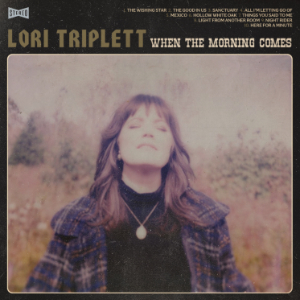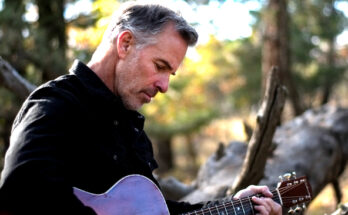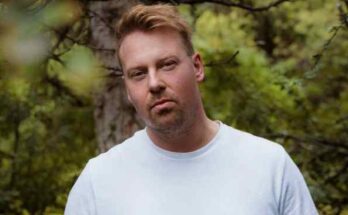Lori Triplett’s songs, and her new album, “When the Morning Comes,” get to the heart of the matter. Whether exploring the feelings that came after her mother’s cancer diagnosis, or the hope that is found from a sliver of light from another room, Triplett’s songs are wise, wonderful, bittersweet, and heartfelt. Relatable. We sat down to chat with Triplett recently about this beautiful, insightful, honest record. This album will likely make your best-of 2024 list.
Hi, Lori! You have a terrific new album that just came out called “When the Morning Comes.” How did these songs come together and what broad strokes can you tell us about the collection?
Thanks so much for having me! The songs on this album were written and recorded over the last several years – a few of them around 2019, but then I’d say the majority of them in 2022. After we tracked the first three songs, I went back to the drawing board because I realized the other seven I had planned to record next weren’t feeling right for this project anymore. I felt like I needed to dig in a little deeper with my songwriting, so I spent the next year working a ton to fund the album and writing new songs in my spare time. I’m so glad I took the extra time to do that even though I would have liked to have finished the album sooner. I have the band, the team at the studio, and my producer, Paul Moak, to thank for that, because I think they really triggered something in me to write stronger songs. When you work alongside really talented people, it forces you to raise the bar for yourself, and they did that for me without having to say anything.
One of the songs on your new album, “Hollow White Oak,” is really great and stood out to me. What can you tell us about this song? What inspired you to write it and what is it about?
“Hollow White Oak” was the album’s first single and always felt like a good soundtrack for the fall, so I decided to release it in late September. I wrote this with my friend and fellow artist, Emily Elgin, back in 2019 on a historical, 500-acre ranch where the actual tree the song was inspired by and written about actually stood. The tree was over 300 years old, and we both felt like someone needed to tell all its stories, so we were glad to be the ones to do it. We thought about all the people who have sat under its shade over its lifetime and all the things the tree had been through. We all have places we go – either physically or mentally – to help us reflect and cope, and this tree represents one of those places on this album. Even though the ranch is now for sale, we had a chance to go back and film the music video on the property, so people can get a glimpse of where it was created when they watch the video.

What was it like recording this album overall? What was the vibe in the studio?
Recording this album was a really fun time. I was fortunate to record it at a beautiful studio in town (The Smoakstack in Nashville, TN) and work with an amazing group of people like Paul Moak (producer, engineer, guitars), Zack Zinck (engineer), Brendon Hapgood and Samuel Hayes (production assistants), Sam Moses (mastering engineer), Julian Dorio (drums), Charlie Lowell (keys, accordion, B3), and Matthew Pierson and Kevin Whitsett (bass). This was actually the first time I’ve been able to record an album live with a band, so it was a great experience working with each of them and hearing the songs come alive for the first time together. “Hollow White Oak” was recorded the first day we started tracking the album.
What do you hope this album conveys to those who listen to it?
I hope those who listen to this album will feel a connection to the songs. I think we all have been through a lot over the past few years, and these songs tell part of my own story of what I’ve personally walked through during that time – loss, fear and despair, love, letting go, and finding hope and purpose again. The title of the album comes from a line in one of the songs on the album, “Things You Said to Me,” that says:
Well there are things worth fighting for when the morning comes.
I want people who are feeling overwhelmed by all that life has thrown at them to know there is always a reason to keep trying and keep going, and that things will be alright.
Since you started out, how has your songwriting changed – both musically and lyrically? Do different things inspire you now? Where do you tend to get your biggest inspiration from these days?
I’ve always had an affinity for melancholy things – songs, art, TV and film, books, etc. I’m drawn to that type of expression more than anything else for some reason, and that has always been the case in my own songwriting and music. I think a lot of people shy away from it, but I always find there’s been healing on the other side of it, so I’ve always welcomed it and invited others to join me to find their own healing as well.
I think over time, my songs have dug a little deeper into the full range of that emotion. I’m no longer just writing a sad song about a breakup like I did in my earliest songwriting efforts as a kid, but I like to expand that into other things that cause people despair, like losing a loved one, the state of the world and humanity, wrestling with keeping your dreams alive or losing your dream, disillusionment, reflecting on the past, being treated unfairly, feeling helpless when you see someone you love suffering, questioning your faith and purpose, etc. Not that I only write on those topics, but over the years, my music has become a little more reflective, I think.
I’ve also started playing acoustic guitar in more recent years, so a different style of music comes out of me when I play guitar versus piano. I’m not as fluent on guitar yet, and I think my current limitations on the instrument actually open up a different door in my songwriting that isn’t there when I’m playing piano, which is my first instrument. I think my inspirations remain somewhat the same as they always have, though – the work of other artists and my own experiences with people and the world around me.
Songwriting can be a really personal endeavor. Is it tough to share that stuff that usually might be private if you weren’t writing a song about it? Does unveiling the songs publicly, when you release a single or an EP or album, make you anxious or is it cathartic to have the songs out there?
Yes, it’s absolutely a very personal and vulnerable thing to release my songs, especially a collection of songs I’ve been working on for so long like “When the Morning Comes.” But I consider it a blessing to be able to do it. If anything, the challenge is not to have any expectations of how my work will be received. Of course, any creative person wants their work to be recognized, appreciated, and loved. And I particularly want my music to find the right audience and connect with my listeners. But over the years, I’ve slowly learned to let go of whether or not that actually happens, and I no longer let that dictate whether or not it’s worth it to continue in the elusive endeavor of creating music for others. I’m at a place where I know I have to release my songs for me alone, and that is enough. If it finds listeners along the way who can latch onto it or who it moves in some way, even better. But I’m just happy when a project is finished and out there for people to discover. It’s a huge release and sense of accomplishment – yet I think I’m never fully satisfied. For me, there’s always a feeling of what’s next and how can I do it better next time.
It’s not uncommon for an artist to be working on something new while promoting an album. Do you have anything in the pipeline to follow this album? What’s next from Lori Triplett?
Well, I’m always writing and working on new things, but the immediate focus will be performing and promoting this album as much as possible and enjoying that process. I’m toying with the idea of doing a very stripped-down piano/vocal project next, but we will have to see how that plays out over time. I think it’s important to give myself a chance to rest creatively and not put too much pressure on myself to dive straight into the next thing. I’ve found I create my favorite and best work when it comes naturally rather than in a rushed or forced manner.


